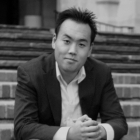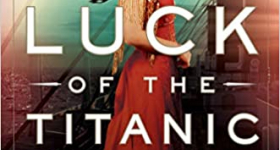Timothy Tau recently had the chance to talk with filmmaker Bao Nguyen (who directed the documentary about SNL, Live From New York!) and author Jeff Chang (Can't Stop Won't Stop) about their new docu-series We Gon' Be Alright, which is based on Jeff's collection of essays and is viewable in its entirety for free at PBS's Indie Lens Storycast Youtube channel. The series is also a co-production of ITVS, with the Center for Asian American Media (CAAM) being a supporting partner.
The series essentially picks up on events and developments that have transpired in the United States since Chang’s book was published in 2016. Each of the four episodes examines a different aspect of the social divide over race in the United States — Silicon Valley resegregation, Hollywood images, Harvard admissions, privilege and marginalization — and how a nation of unprecedented diversity is becoming more divided and inequitable.
“We’ve reached this point of racial division in U.S. politics slowly — it’s been over five decades since the Civil Rights Act. Yet the last few years have quickly accelerated resegregation. So much of what we do in our daily lives actually obscures the reality of our separateness and we hope that the series helps us see what is happening and spark the difficult conversations about how we can move forward together,” said writer Jeff Chang.
“When I first read, We Gon’ Be Alright, I was drawn to how Jeff described some of today’s most pressing issues with such a keen sense of narrative,” says director Bao Nguyen. “In adapting it to docu-series, I wanted to make sure the issues and Jeff’s prose were salient in each episode while at the same time using the medium of documentary film to attract a new audience. Each episode takes a slightly different approach visually, but it’s Jeff’s voice that brings it all together. I’m really grateful to have had the opportunity to work with him on this meaningful project.”
Congrats on putting together this compelling digital docu-series. How did the idea of adapting Jeff's acclaimed essay collection for a documentary or video-based project initially come about?
BAO: It was a very rewarding experience finally working with Jeff as we have been planning this project for some time. In terms of how it all came about, Jeff and I have conflicting stories about that. Jeff claims it was my idea, but the initial idea was all Jeff. My version of the story is that he emailed me telling me he had a series idea and wanted to talk on the phone about it. I was based in Vietnam at the time and he was in Berkeley, so it took some time to coordinate a call between us. We chatted and he straight up told me that he thought the book would be great as a series. When I first read the book, I had some thoughts in the back of my mind that it would work well as a series considering how it was structured as a collection of essays, but I wasn't seriously thinking of adapting it into anything at the moment. We let the idea marinate a bit over time until Karim Ahmad from ITVS reached out to me six months later about series ideas and luckily we had this project in our back pocket already. Again, Jeff always claims I was the one with the initial idea, but I have the electronic trail to prove it was indeed him.
Bao mentions in the press release that he wanted to somehow integrate or make "salient" Jeff's prose to every episode. How did that work? Was Jeff involved in the screenwriting process? Was there a concerted effort to include text or voice-over segments straight from the book in every episode? Or was there an attempt to create something "new" from the base material?
BAO: Jeff was very much an equal creative partner on this project, so he did a majority of the writing process along with our co-producer Sahra V. Nguyen. However, the series is not a straight adaptation of the book, so all the writing in the series is different from the writing in the book. In adapting the book which came out in 2016, I wanted to make sure we kept the spirit of the book but made each episode stand on its own and have relevancy with today's issues and events. I knew in order to do this, we would rely a lot on Jeff's new writing for the series as a way to include Jeff's voice beyond his interview questions. It was all a very symbiotic relationship where the words came from Jeff and the visuals came from me.
JEFF: I was involved in writing all of the episodes and we chose to use both pieces from the book as well as to bring in fresh work. One of the important things for us was to bring the themes of the book up-to-date. The book was written and came out before the 2016 elections, and we both felt it was really important to be able to capture a sense of all that had happened since. In that regard, the series became a whole new thing based on the foundation of the book.
How were the interview subjects for the documentary decided/cast? Were some of them interview subjects from the book? Were you able to cover "new ground" by means of these documentary-based interviews that the book wasn't able to due to the differing capabilities of the two mediums of print vs. film?
JEFF: We wanted even the stories that are touched on in the book — Bay Area resegregation and Asian college admissions — to get a new kind of life. These were stories that were close to us in different kinds of ways. We got to explore Hollywood in Episode 2, which is the world Bao works in. For Episode 1, I’ve done educational work in East Palo Alto and have known Isaiah Phillips as a legendary Bay Area artist/dancer/organizer for a while and was surprised to learn from him that he had a story about displacement that literally hit so close to home. They also lent themselves to Bao’s poetry. I think that there are many parts of the book that are abstract, and we wanted to choose stories that lent themselves to Bao’s powerful visual drama and evocativeness. I especially love the way he approached “The In-Betweens.” The beautiful contrasts he draws between the grittiness of street protests and these abstract moments is something I’d love to achieve in my own writing.
BAO: For Episode 1, Jeff had known Isaiah beforehand and knew he had a very compelling story surrounding the effects of gentrification. He also happened to be in Kendrick Lamar's Alright music video, which helped make the connection deeper between the title of the book and the themes of Kendrick's song. Again, since we wanted to create something different but continue in the spirit of the book, most of the interview subjects didn't come directly from the book but were still affected by the issues discussed in it. We wanted to feature a wide range of voices from different racial backgrounds but also different generational backgrounds. Through the use of film, I think there is a deeper emotional resonance when you see someone telling their story on-camera and hearing their voice versus reading their story just through writing.
I feel all of these "modules" covered in the docu-series and the book are just as compelling as the next — e.g., resegregation in Silicon Valley, Hollywood diversity (or lack thereof), college admissions, privilege v. marginalization — but which one do you feel deserves particular mention or focus in this day and age (as well as presidency)? Is there a common thread that runs through each module and what do you feel that thread is?
JEFF: All of the stories are interrelated in that they are about this condition of American resegregation and what we need to do about it. We tackle the different dimensions of it — displacement, cultural equity and representation, educational opportunity and what we owe to future generations. We are living through a particularly divisive moment, and our argument is that resegregation is a large part of the reason why. I am particularly attached to the story of “The In-Betweens.” Bao and I both went through profound emotional loss during this project, and this episode became a real gift of healing from Bao to me and my family.
BAO: For me personally, I related the most with Episode 4 ("The In-Betweens"), which deals with, as you mentioned in the question, privilege vs. marginalization. In a way, this topic touches upon all the topics discussed throughout the whole series. Jeff's line about the "ethics of identity" is something I think about every day as I live my life, straddling the line between my experiences of being privileged and my experiences feeling marginalized. It's made me very self-aware of my status and responsibility in this world. In addition to privilege vs. marginalization as a common thread throughout, the idea of resegregation is prevalent through each episode, both in subtle and not so subtle ways.
Production-wise, how long did it take for all the episodes to be written, produced (i.e., cast) and finally shot? Were there any interesting challenges that arose during the filmmaking process that were unique to this distinct type of project? For example, did filming a docu-series based on a collection of essays present any challenges beyond the filming/production process for a normal documentary? Any crazy/hilarious/interesting stories from the set? Did you end up learning anything new after doing the project?
JEFF: There was a long incubation period in which we shot and finished Episode 1 and then we got the okay to go to series last year. We actually shot the episodes all in an intense two-week period in late December of last year. Then finished it all up earlier this year. It was a really easy process to work with Bao, who is the chillest of chill. He’s so chill sometimes he falls asleep. To be fair, he was often working on insane jet lag, commuting from Vietnam. I’m grateful everyone put up with me. As a journalist, it’s my job to ask questions, so I ask a lot of them. And since this was my first time actually being involved in the aspects of making a doc as opposed to just doing an interview for one, I asked a ton of questions. I’m very lucky that everyone — Bao, Kimmie our showrunner, Sahra our co-producer and Maleri our associate producer — was super patient with me. What’s that for? Where do I sit? What’s going on now? I was just bombarding them with questions all the time.
BAO: I believe from our first production meeting until we had our final delivery was a period of eight months. That's not including the discussions Jeff and I had about the genesis of the project. This is the second web series I've directed/produced, the first one being Employed Identity for PBS, but this was a much bigger undertaking. I should say that 8 months is pretty quick for a series like this, and we couldn't have done it without the amazing work of our producing team, in particular our showrunner/producer Kimmie Kim, co-producer Sahra V. Nguyen and associate producer Maleri Sevier. Our team was spread across two coasts and two continents but we really built a strong sense of camaraderie and purpose from the start. I think we all respect and admire Jeff's work so much, it really inspired us to come together and make it all work. I felt a huge responsibility to make something that Jeff felt respected and honored his work so that was my biggest challenge in adapting the series. There are a few funny stories but I might get in trouble from Kimmie if I shared …
I was also wondering or fascinated by the aesthetic choice to have most of the scenes shot in B&W, which somehow gives the interview scenes a grittier, more realistic feel — what were the motivations behind this stylistic decision?
JEFF: Bao has a great story about this he can tell. I can say that I really appreciated his choice to do it this way. The shots in color pertain both to a past and an imagined future. It was a brilliant move, aesthetically and philosophically. Also, here’s the thing about Bao — he always goes for the highest level of difficulty and makes it look easy as he pulls it off.
BAO: When you think of the word "resegregation," obviously the "segregation" part is what stands out the most. And for me when I think of segregation, I begin conjuring up the iconic black and white images during the 1950s-1960s period of racial segregation in America. So in the series, when we are talking about this idea of resegregation today in America, I wanted to have this aesthetic link between the two periods in time and allude to the notion that history can sometimes repeat itself.
After completing this project, would you be interested in doing similar ones? Where do you think storytelling (or maybe the unique type of storytelling you perform in this project) is going, especially after doing this type of hybrid between the print and film versions of the nonfiction form?
JEFF: I’d be very interested in doing more, and to explore a longer form. The Harvard admissions story could have especially benefited with a longer form — huge props to Hasan Minhaj, but we have so many other pieces to this story that need to be told, and especially after the huge admissions controversies this past school year, a lot more to say. With that said, I really loved that we were able to bring to each episode its own feel, style and sensibility. Even Episode 3, which has a newsmagazine style to it, begins and ends with a more experimental kind of format — and then of course there are echoes of this episode in “The In-Betweens.” I love that Bao was able to freak the form. I’ve tried to do that in my writing, from Can’t Stop Won’t Stop all the way up to now. It has been a blessing to be able to write long enough to be able to be involved with someone of Bao’s genius. As I said, I aspire to trying to achieve the kind of effortless mix of abstraction and realism he does in some of these brief sequences. And I would love to explore what that looks like in a longer form.
BAO: I really loved the process of collaborating with Jeff and adapting his writings into the visual form so I would love to adapt more of his books in the future. I don't know if the storytelling in this project is unique but I would say that Jeff and I were focused on tackling big issues like gentrification, affirmative action, etc. on less didactic and academic terms and more on the human and personal level. I believe the biggest strength in storytelling is in its ability to break barriers and create empathy. By showcasing nonfiction stories around important issues like we hopefully did in this project, we can continue to play on this strength of stories and storytelling.
What are the next projects for the both of you, to the extent that you can or are allowed to disclose? Is Jeff planning to write (or already writing) a sequel?
JEFF: I’m working on a bio of a very famous Asian American. I’m also co-writing a young adult version of Can’t Stop Won’t Stop with Davey D and a 15th anniversary (!) edition of that book too. In publishing there is a trend toward shorter, more topical books and of course, there is so much material to write about. There may be a sequel. One never knows.
BAO: Jeff and I originally met through our mutual friend, Joy Yoon, who introduced us because we were working on projects with the same subject. Jeff was writing a book and I was developing a film. Four years later, I'm happy to say we are both in the later stages of completing our respective projects that deal with a very famous Asian American. As mentioned earlier, I would love to adapt some of Jeff's other books into film or TV so we are discussing that possibility at the moment as well.










Comments